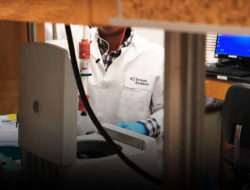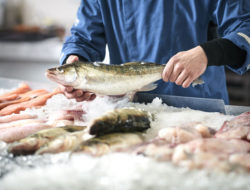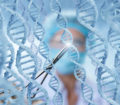1 The pig and the pope
What do farm animals, Pope Francis, and Salk Institute researcher Juan Carlos Izpisua Belmonte have in common? They each contribute a piece toward solving a very big, important puzzle: a shortage of donor organs needed for transplants. Dr. Izpisua’s lab uses stem cells to study regenerative medicine, and the idea is to grow human organs inside animals that could be transplanted into sick humans. But the National Institutes of Health halted funding for this kind of research. In California, Izpisua went through several different committees to gain permission to develop a pig embryo for only a third of its gestation. Pope Francis, on the other hand, is apparently more forward thinking. Izpisua told Scientific American that in his native Spain, the culture is more open to this kind of research, but since it’s a devoutly Catholic nation, when he worked there he had to OK his studies with the pope. “He very nicely said yes,” Izpisua said. So, in Spain, researchers can theoretically develop a pig with human organs from an embryo until birth. But the science is not all there yet. Ethics aside, Izpisua told Scientific American we are far from actually growing human organs inside animals. But the fact that the U.S. is moving slower than the Vatican on this kind of research is notable.
2 Grail unveil
With the launch of Grail, genomic sequencing giant Illumina is betting that its technology can make an impact on cancer, a market that could reach upward of $12 billion. Grail will focus on liquid biopsy blood tests for cancer screening. The startup already found believers in investors like Jeff Bezos and Bill Gates, who have invested $100 million.
3 The Rain Maker
Parched San Diego could learn a lot about water conservation from Amir Yechieli, a science teacher from Jerusalem who’s known as the “Rain Man” in his home country. He developed a rain harvesting system that collects storm runoff from roofs in barrels, allowing the water to be reused for flushing toilets, cleaning, and irrigation. After a winter storm 15 years ago, Yechieli calculated that runoff from the roof of the school where he taught could have supplied the entire campus with six months worth of water. He installed his first rain barrel system there and since then, nearly 150 schools in Israel have adopted his rain harvesting technique. A recent cross-cultural exchange facilitated by the U.S.-Israel Center on Innovation and Economic Stability brought Yechieli’s rain barrels to Franklin Elementary in City Heights, Pacific Beach Middle School, and Encinitas Union School District Farm Lab. Students have decorated the barrels—each can hold about 600 gallons—and will document the system’s performance. Yechieli hopes that San Diego will experience a shift in water conversation the way that Israel did: After it embraced every possible way to preserve and recycle water, the desert nation overcame its drought and now has more water than it needs.
4 The Shoe Fit

Need a new pair of Vans? You’ll want to keep an eye out for the limited edition “grizzly bear” shoe that will be in stores this month, since it was designed by local art students. Kelly Foulk, an art teacher at Carlsbad High School, worked with a collective of students to enter the Vans Custom Culture contest, a nationwide competition in which art students design new shoes for the surf and skating line for the chance to win $50,000 for their school. “There were about 25 students who worked every day at lunch and after school to think of ideas, create mock drawings, and then hand-paint our designs onto Vans shoes,” Foulk says. The contest requires shoe designs to fit four themes: art, music, action sports, and local flavor. Foulk’s students were inspired by the California state flag and dreamed up the grizzly bear shoe for the local flavor category. “We wanted to create an illusion that the inside of the shoe was the bear’s mouth, and the whole shoe was the bear’s head,” Foulk says. She and her students got word their shoe designs had made it to the top five, and Vans flew the entire team to New York City, where they won in three categories, including the grand prize. Winning the contest netted Carlsbad High School’s art program a total of $75,000, which made a huge difference in student resources, since art programs have suffered from budget cuts. “All these new supplies are allowing us to make better artwork and experience more,” says Francesca Towers, one student from Foulk’s design team. “These supplies and this contest have shown me that I also want to be an art teacher when I grow up.”
5 Boom goes the data
With 10,000 baby boomers a day turning 65, the impact our parents and grandparents have on our health care could be as big as the Beatles, JFK, and Woodstock. The Gary and Mary West Health Institute is working hard to anticipate how the health care system can adapt to seniors’ needs.
The La Jolla–based institute is ramping up its big data capabilities, recently launching a data science core team to analyze massive health care databases —and help predict what these seniors may need. Bridging open-sourced, online computing capacity with secure access to major databases like Medicare claims and billing information, the team is helping analyze how patient care can be improved.
Initial areas of research for the team include analyzing gaps in senior dental coverage, studying cost savings from home-based care programs, and modeling ER and hospital demand over the next decade.
“We’re developing these capabilities to help all of us think and act differently about successful aging,” said Dr. Zia Agha, West Health Institute’s executive vice president of clinical research and medical informatics.
Dr. Agha notes that the institute is open to sharing the data and insights with other researchers.
6 Pop Science

Who knew the Kardashians would have an interest in molecular biology? In a recent episode of Keeping Up with the Kardashians, matriarch Kris Jenner urged her daughters to take a DNA test made by San Diego–based Pathway Genomics that screens a patient’s risk for developing breast cancer. Doctors visited the family in L.A. to draw blood samples, and viewers saw Kris, Kim, and Khloé travel to the company’s Torrey Pines headquarters to get their results—they all tested negative for any mutations in the BRCA genes that can cause breast cancer.
While the star-studded shout-out raised awareness for Pathway Genomics and cancer screening, the company had a link to boldface names long before its Kardashian Konnection. Its boards read like a who’s who of Washington: Newt Gingrich, former Chair of the Joint Chiefs of Staff Peter Pace, former Assistant Secretary of Defense for Health Affairs Ellen Embrey, and former Secretary of Commerce Barbara Franklin are listed as advisers. Nor is the company a stranger to controversy: After the Kardashians episode aired, CBS News released an investigative report noting that the FDA cited concerns about the validity of liquid biopsies.
7 50/50
In honor of its 50th anniversary, UCSD Extension is offering up $50,000 in scholarships for anyone looking to learn a new skill, advance their career, or just find a new passion. Anyone with a high school degree or higher can apply for a “next fifty” scholarship, which will be awarded to students “who demonstrate outstanding promise and potential,” according to the announcement. The $5,000 scholarships can be applied to any UCSD Extension certificate program, from children’s book writing and accounting to algae biotechnology science and data mining.
8 House Calls Are Back

Thanks to the latest mobile apps, we can hail a ride, buy groceries, or have dinner delivered with just a few taps on our phone. Now we can request a doctor to come to our home or office the same way with Heal, an Uber-esque app that expanded to San Diego in January, which dispatches a general practicioner or pediatrician, along with a medical assistant, on demand. Founded by Dr. Renee Dua, a nephrologist in L.A. who started her medical career with a bachelor’s in biochemistry at UCSD, Heal merges new technology with the old-school house call—a practice doctors in the U.S. abandoned decades ago. Qualcomm Chairman Paul Jacobs and singer Lionel Richie have financially backed the company.
A doctor can be requested anytime from 8 a.m. to 8 p.m. (not all night long) through Heal, and just like with Uber, you can see their location and ETA through the app. Members of most major California PPO/EPO insurance plans—including Anthem Blue Cross of California, Blue Shield of California, Cigna, Aetna, and United Healthcare—pay the standard co-pay, and everyone else is charged a flat fee of $99. A hundred dollars may sound steep, but not having to wait for hours in urgent care or more than two weeks to see your primary care physician is priceless.
9 Top 10
Here’s some fodder for your next business trip to the Bay Area. The next time you hear that there’s no VC money available in San Diego, share this stat: San Diego has the sixth highest amount of VC capital investment dollars, according to a report from the Martin Prosperity Institute. Although San Diego is ranked below Boston, New York, and San Francisco, there’s more VC money here than in London, Beijing, Seattle, and Austin.
10 Dispatch: Updates and impacts from innovation around the globe

Seattle
Passive Wi-Fi
A team at the University of Washington came up with a way for small gadgets without a power source to connect to computers and smartphones, with “passive Wi-Fi” that takes 10,000 times less power than usual.
Boston
Exit strategy
Resilient Systems, a cybersecurity startup with 100 employees, was bought by IBM Security for an estimated $100 million.
Brussels, Belgium
Restoring trust
After two years in the making, the European Union finalized its agreement with the U.S. on how companies like Facebook and Google can transfer data on EU citizens. The region passed the Privacy Shield law after Edward Snowden revealed the U.S. government’s controversial surveillance tactics.
Austin
Where’s my photo?
A company called Waldo Photos is developing a tool to help find all the photos of you taken by others. It acquired $5 million in seed money this winter.
Bangkok, Thailand
Hail two wheels
Uber users in Thailand can now opt to be picked up on a two-wheel motorbike through the app. Motorbike taxis are already common in the Southeast Asian city for weaving through traffic, and Uber said this pilot program could expand to other countries.
Auckland, New Zealand
Finest ambassadors
Reps from the San Diego Regional EDC and Mayor Faulconer’s office traveled to the City of Sails to create more global ties for our city.
Sydney, Australia
In-flight connection
Carlsbad’s ViaSat just signed a deal with Qantas Airways to bring high-speed Wi-Fi onboard all its domestic flights.
Pitch
This is where we give three San Diego startups 150 words or less to sell our readers (potential investors?) on why their product or service is the next big thing. Want to pitch us in a future issue or invest in one of these companies? Email erin@sandiegomagazine.com.
11 Yago
Millennials want to know what’s going on around them, and it’s not always easy to find out. Yago is a photo and video sharing application that provides a framework to facilitate communal discussion surrounding moments that are anonymously curated by the user base. Yago provides context for users to engage in conversation by including the time the moment was created, along with the location the broadcaster specifically chooses to tag. All content and accompanying conversations expire after 24 hours, to create a sense of urgency for users to return to the app, as well as to keep the content recent and relevant. Yago was founded in San Diego’s East Village and is fresh out of beta testing with its just-released, polished product.
12 RippleNami
RippleNami has innovated the way nonprofits, foreign governments, and companies provide aid and support to developing nations. Its easy-to-use mapping platform can host, collect, and interpret real-time data about a region’s local resources and water supplies, agriculture, disease outbreaks, and political instability. RippleNami gives aid workers accurate information about what’s happening in a community, so they can quickly address its most pressing needs. Nonprofit Nuru International uses RippleNami when entering remote villages in Kenya and Ethiopia. Aero-Pioneer of Africa, which helps nonprofits in East and Central Africa with aviation logistics, uses the technology for real-time runway information. RippleNami was recently selected by the United Kingdom’s National Health System to map and modernize its veterans’ services, which assists more than 12 million people.
13 Tourrs
Tourrs is a marketplace where anyone can create, sell, and buy smartphone-guided tours. You can share your passion and knowledge with locals and travelers alike—and get paid to do it. Simply build your tour on your smartphone, including photos, videos, audio narration, and sound effects. You don’t need any special equipment or a laptop to create an amazing experience. It’s not just for travelers; locals can find things to do in their own backyard. As the tour creator, you’re completely in control of how much you want to charge. If you’re trying to give back, make your tour completely free. Or charge up to $5 and keep 50 percent of the price for yourself. Download it from the App Store and start discovering tours for your trip or weekend, and creating experiences of your own.
14 Beyond Band-Aids

Mention Johnson & Johnson, and the first things that come to mind are baby shampoo or Band-Aids. But the pharmaceutical giant does so much more than dominate drugstore shelves—they help nascent biotech companies get their start. They kicked off this initiative here in San Diego with its incubator space, Johnson & Johnson Innovation, JLabs: a 20,000-square-foot facility where about 50 startups are researching everything from “smart” therapies to treat acne (Dermala) to how doctors can diagnose patients remotely (Telmedx) in rented lab space. JLabs plays the role of a landlord (albeit a really cool landlord), providing expensive lab equipment and even sponsoring social hours. Alumni of JLabs include Arcturus Therapeutics, and Johnson & Johnson now has six JLabs around the world. Hey-O to San Diego for being the first!
15 3 Cool Creative Meetups
Creative Mornings
Monthly meetups downtown, where creative topics are discussed and creative people connect.
BPIF
Beer, Pizza and Ideas Fridays are for friends of the Balboa Park Online Collaborative to think big, try new technologies, and brainstorm things to bring to the park.
San Diego Startup Week brings together our brightest entrepreneurs, investors, and advisers from June 12 to 18.
16 Talent Show
How San Diego’s skilled workforce stacks up to nine other cities
The San Diego Regional Economic Development Corporation recently presented these reasons to be proud of our fair city, from a study including Austin, Denver, Portland, Seattle, San Francisco, San Jose, Baltimore, Boston, and Pittsburgh.
- San Diego has the second-highest concentration of scientists and engineers
- Workers here have the lowest average commute time
- More than 60 percent of people who move to San Diego have a college degree
- Our tech and scientific R&D companies have the lowest turnover rate
17 Take That, Arizona
Global education summit moves from Scottsdale to San Diego

It looks like San Diego has stolen a marquee event from our neighboring conference destination in Scottsdale. And guess who will be here to kick off the inaugural run? Bill Gates. As part of his foundation’s effort to improve American education, Gates will deliver the keynote for the ASU GSV Summit, a gathering of the country’s best minds in innovation, investment, and leadership, April 18–20 at the Manchester Grand Hyatt. I’m told that author Jim Collins (Good to Great, Built to Last) has some never-before-released research he plans to unveil, and former Secretary of State Condoleezza Rice, actress Ellie Kemper, and Guy Kawasaki, the original tech evangelist for Apple, will also be speaking. Why the move here? GSV Advisors founder and managing partner Deborah Quazzo told me it was time for a change, and that UCSD’s work in innovation and education, along with our downtown, makes San Diego an optimal city for the event. Speaking of UCSD, I wondered if there were any plans to change the name, since the “ASU” stands for Arizona State University. Nope. While praising UCSD, Quazzo also heaped praise on ASU as a founder of the event and a great partner. —Mindy Fletcher
18 Aztecs Abroad
San Diego State University just won a $30-million grant—the largest in the school’s history—beating nearly 30 other colleges for funds from the Millennium Challenge Corporation, a foreign aid agency established by Congress. The grant will send a dozen Aztecs to study abroad in Georgia starting this fall, and it will also help upgrade labs and equipment at Tbilisi State University in the country’s capital.
Tags: Innovation, Tip Sheet






























